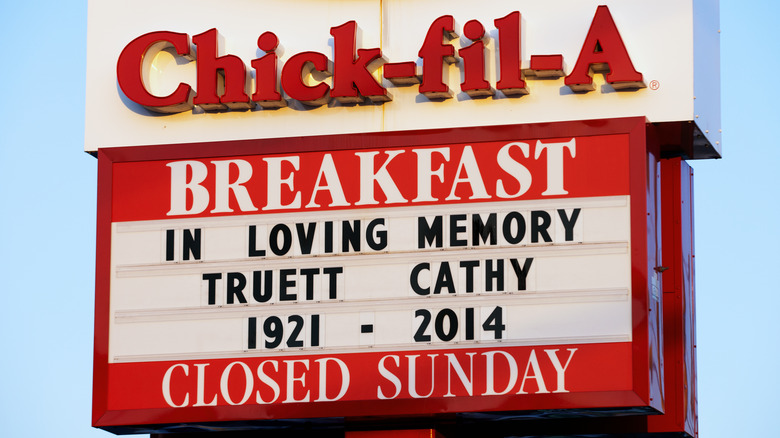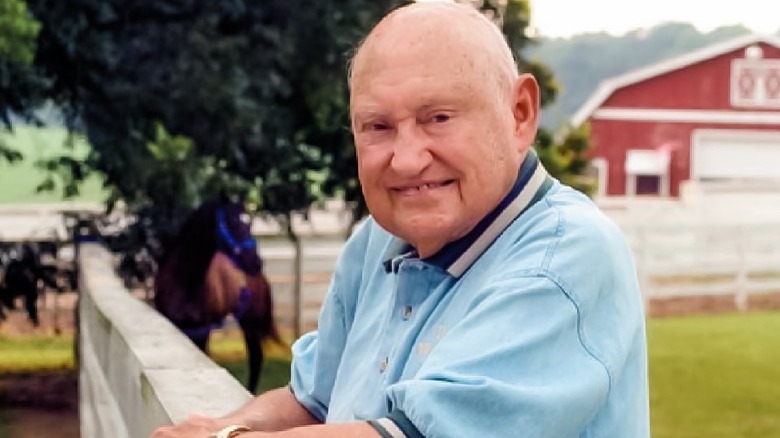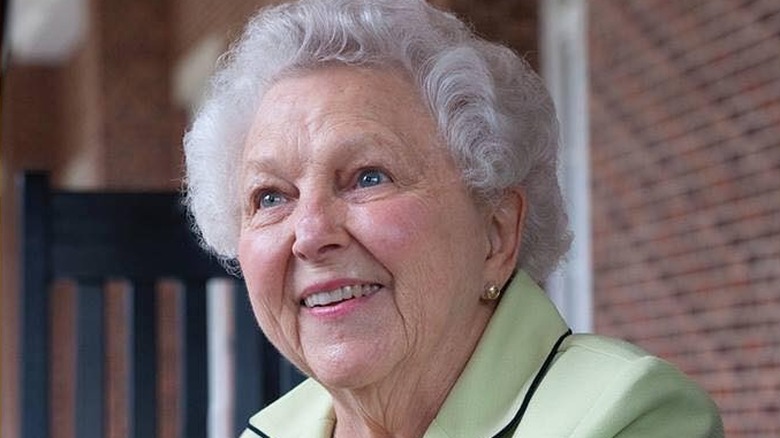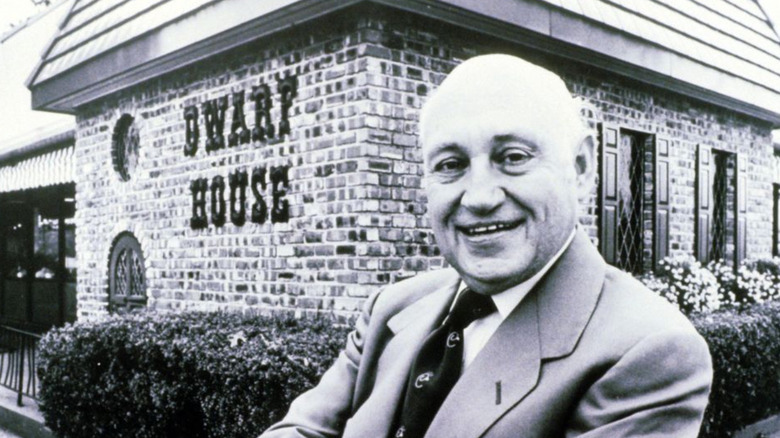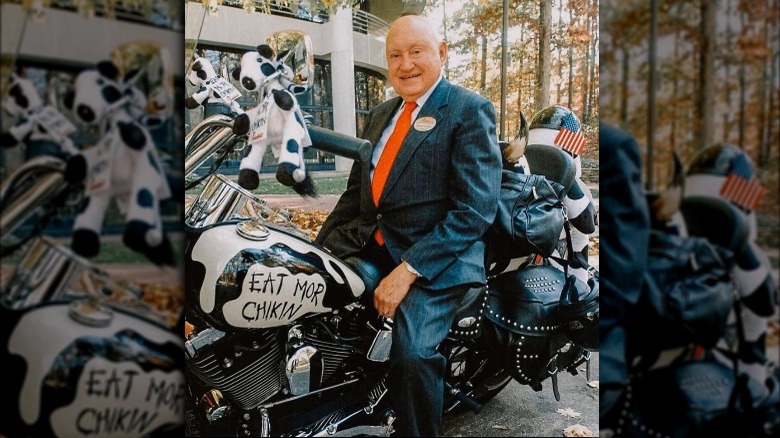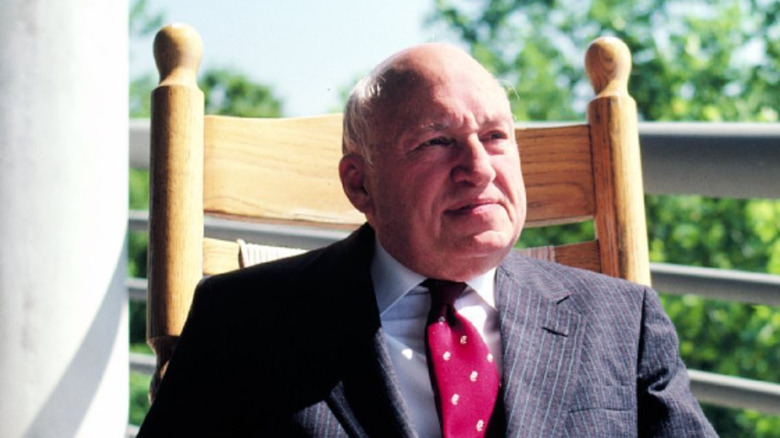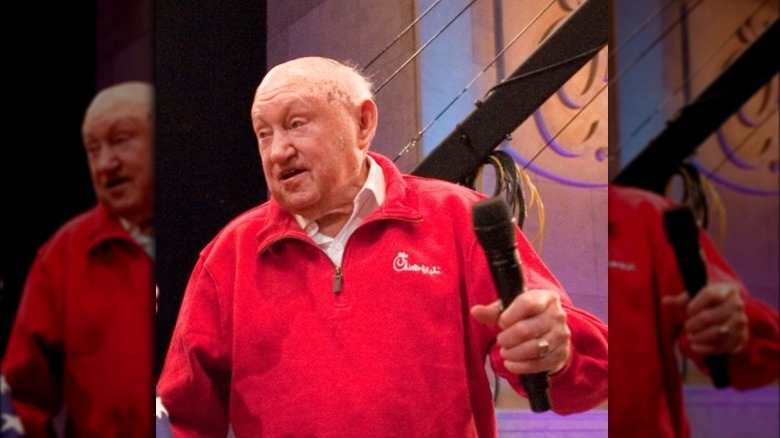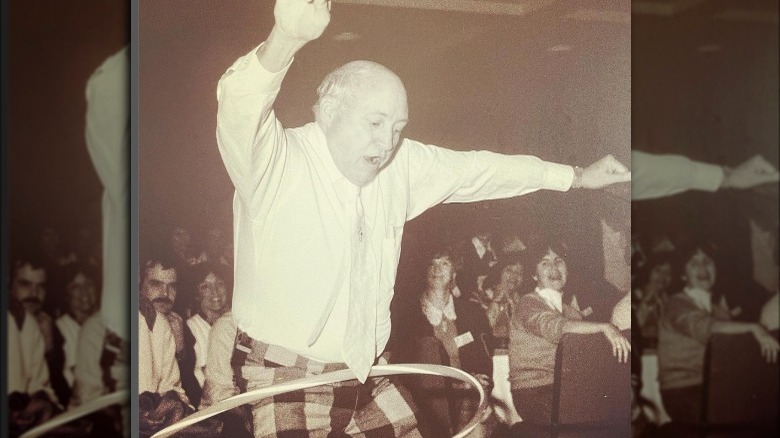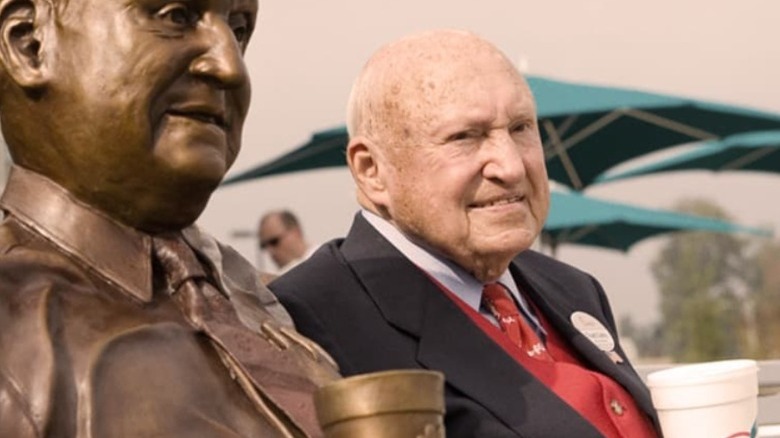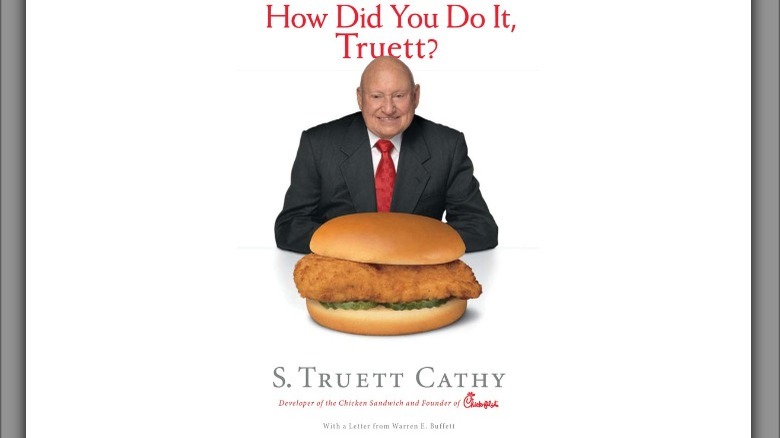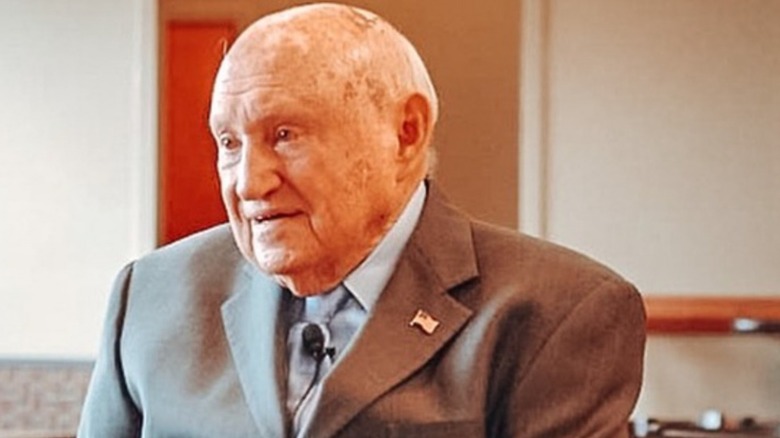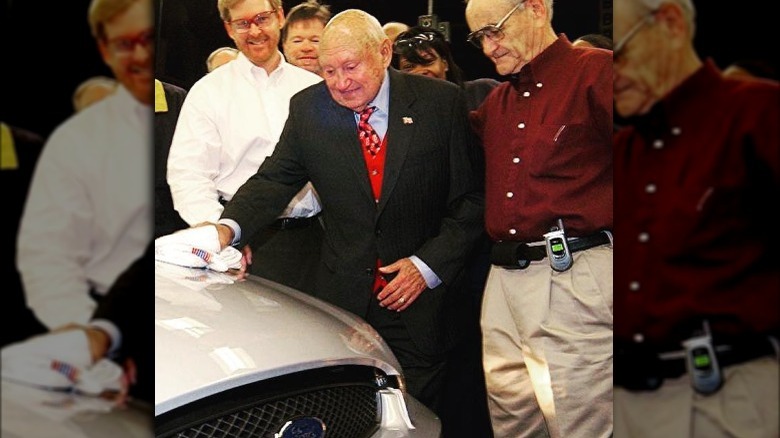The Untold Truth Of Chick-Fil-A Founder S. Truett Cathy
Born in Atlanta, Georgia on March 14, 1921, Samuel Truett Cathy, may be most famous for having founded the Chick-fil-A chain of fast-food chicken restaurants featuring his beloved creation, the pressure-cooked chicken sandwich, but he's also very well known for his intense generosity as a philanthropist, according to the New Georgia Encyclopedia. While Truett's extraordinary business success would appear to speak for itself, he will also be remembered for his admirable entrepreneurism (per Wall Street Journal). His innate talent and uncanny insight into all things business have inspired many, both through example and through his various books, in which he shares his various tips for achieving success.
Truett Cathy credited his success to the value he placed, from a very early age, on hard work, love of the family, and honor and awe for one's god. When he died at age 93 in September 2014, he left behind not only an empire, but also an extended family the size of a small village, consisting of his wife of 65 years, three children, and upwards of 40 grandchildren and great-grandchildren, according to the Los Angeles Times. Of course, these are just the facts you may already know. There's quite a lot more to unpack about the life of Chick-fil-A's founder, S. Truett Cathy. Join us as we delve into the untold story.
Chick-fil-A Founder S. Truett Cathy was born in poverty
Born in Eatonton, Georgia in 1921, S. Truett Cathy was the second-youngest of seven siblings, according to the Horatio Alger Association of Distinguished Americans (HAADA), which awarded Cathy a membership in 1989. "I was born in poverty," Cathy told an interviewer in 2007 (via Inc.), and things only got worse when the Great Depression hit in October 1929. Cathy recalled that his father never quite got over the trauma that period wrought, per HAADA. His mother, who was already running a boarding house out of the family home, became the close-knit family's primary breadwinner as well as its central inspiration and influence. Not for nothing, the Chick-fil-A website points out that many of Truett Cathy's earliest memories involve helping his mother in the kitchen.
All the Cathy siblings helped out with the boarding house business, including cleaning the bathrooms and making the beds. Nevertheless, by the time he was 8, Truett Cathy had already started his own business — selling Coca-Cola, per Inc. By age 12, he and his brother, Ben, were delivering newspapers in Atlanta. By age 14, Truett and Ben had become the primary breadwinners of their family. Although poverty took its toll on Truett's self-image, his circumstances and his triumph over them helped him to draw strength. "It made me realize you can do anything if you want to bad enough," he told the Atlanta Journal-Constitution.
S. Truett Cathy married his childhood sweetheart
S. Truett Cathy met his future wife, Jeanette (nee McNeil) at Atlanta's West End Baptist Church when they were both around eight years old, according to the Atlanta Journal-Constitution (AJC). But love did not blossom until Truett and his younger brother, Ben, opened their first restaurant, The Dwarf Grill (later renamed The Dwarf House, which now has multiple locations and is just one of five restaurant brands started by Cathy, per Chick-fil-A). Apparently, the tiny diner (discussed more below) had a jukebox whose music provided the soundtrack for a burgeoning romance that would last nearly 66 years until Truett Cathy's death in 2014.
Truett and Jeanette married on September 19, 1948, according to Truett Cathy's biographer, Dr. Richard E. Hattwick (via AJC). The modest farmhouse they lived in had been built by Truett, himself, along with his older brother, Horace, whose name will come up again shortly. Soon after the wedding, Jeanette began working at The Dwarf Grill, becoming an integral part of its day-to-day operations until she and Truett became parents (they would eventually have three children). However, Jeanette's contributions to Truett's success went well beyond that, according to Trudy Cathy White, the Cathys' only daughter. Of her mother's next role as homemaker, Trudy has said that "much of what Dad could do was because of what Mom was doing behind the scenes" (via Chick-fil-A).
Truett Cathy's first restaurant was a tiny place with a tiny name
In 1939, at the age of 18, S. Truett Cathy was drafted into the U.S. Army, according to Atlanta Journal-Constitution (AJC). He remained in the service until 1945, receiving an honorable discharge when World War II ended. Upon returning home, Truett and his younger brother, Ben, felt the call to build something of their own. So they pooled their then-meager capital resources, and with the help of a $6,400 loan from a local bank, came up with the $10,600 they needed to open up a 24-hour diner (Monday through Saturday) in Hapeville on May 23, 1946 (via The Wall Street Journal). The Dwarf Grill was just 512 square feet in total and had a 26 seat capacity, per AJC, making it unusually small for the time.
With precious little restaurant experience between the two brothers, The Dwarf Grill (later The Dwarf House), was nevertheless a stunning success, in part because it was strategically located across the street from a Ford auto plant. Patrons were willing to wait outside in the hot sun for their turn to dine, per AJC. The work was grueling, with Cathy grinding burger meat himself after purchasing it through unconventional channels, as was necessary in the period immediately following World War II.
S. Truett Cathy lost two of his brothers in a plane crash in 1949
The small eatery opened by S. Truett Cathy and his brother, Ben, was thriving when tragedy struck on a Saturday in July 1949. Ben had just finished his shift, and he and his older brother, Horace, both licensed pilots, set off for Chattanooga, Tennessee on a small plane. The plane crashed near Dalton, Georgia, and both Ben and Horace were killed.
The loss hit Truett Cathy hard, he wrote in his book, "Eat Mor Chikin: Inspire More People," but he stepped up, both for himself and for the brothers he lost and the families they both left behind, including Ben's wife and daughter, whom Truett helped provide for in the years following her father's death. So did Truett's new wife, Jeanette, who stepped in to greet tables, run the cash register, and serve food at The Dwarf Grill. Although Jeanette took a leave, so to speak, to raise the three Cathy children who came along in the next several years, as soon as the kids were what she considered old enough, they too were welcomed into the family business, according to the Chick-fil-A website.
The Cathys had three children and raised them with family, business, and church being one and the same
S. Truett Cathy and his wife, Jeanette, didn't start having children immediately after they married, as many couples did back in the 1940s and 1950s. It's unknown why, but it's possible they were too busy working at the family restaurant. Dan Cathy, born March 1, 1953, according to Bloomberg, is the eldest, followed by Donald (known as "Bubba") and Trudy.
As soon as the children were old enough in Jeanette's eyes, they were welcomed into the family's restaurant business. All are still involved in the business today, but their involvement goes back much further than many realize. All three spent considerable time at the restaurant from an early age — a tradition inspired by Truett's own youth. "We were all family, working together," Truett Cathy explained, per Chick-fil-A. "For us, family, business, and church weren't separate aspects of our life. They all blended in together. Those early experiences shaped our children's viewpoints about life and work."
In the year before Truett Cathy's death in 2014, the elder Cathy installed Dan as CEO of the now vastly-expanded family business, per Restaurant Business Online. Dan had already been working in the C-suite as COO since 2001. In 2019, his son, Andrew, took over as CEO.
S. Truett Cathy was a colon cancer survivor
S. Truett Cathy was not just a survivor of poverty and the tragic death of two of his brothers in a plane crash during his 20s. He was also a survivor of colon cancer, according to Georgia's 11Alive News, citing Cathy's iconic 2002 memoir, "Eat Mor Chikin: Inspire More People." And by long-term, we mean he went on to survive for five and a half decades.
When Truett got his diagnosis at age 38, his wife, Jeanette tried to reassure him. "God isn't finished with your life yet," she told him. "I don't think He's going to take you," Truett recalled. Truett was not nearly so optimistic. Nevertheless, Cathy approached his surgical treatment with a sense of peace because of his faith. "Whether I lived or died, I would be with God," he recounted in his 2002 memoir. Ultimately, having survived colon cancer, Cathy felt compelled to provide comfort to children who were sick, among his other philanthropic activities, according to Harding University's The Bison.
What S. Truett Cathy did on Sundays – because he wasn't working at Chick-fil-A
Ever had a Chick-fil-A jones on a Sunday? Then you must know that Chick-fil-A is not open for business on Sundays. Nor has it ever been, according to Chick-fil-A's website. The decision was made because Truett, himself, had experienced the stress, both physical and spiritual, that came from working seven days a week (via Instagram).
Truett stuck to his ethos even at the risk of turning off potential customers. "People have always said I was crazy not to be open on Sunday," he told the Shreveport/Bossier Christian Family in 2011 (via Blue Toad). However, Cathy didn't mind losing business if it meant that he and his employees would have Sunday to honor their lord. Moreover, he saw closing on Sundays as a way to attract employees who embraced his kind of values. Finally, Cathy believed that having Sunday off supported the unity of all families, even those that opted not to attend church.
When Cathy wasn't worshipping in church on Sundays, he was teaching Sunday school, according to Juvenile Justice Information Exchange, which wasn't work so much as an act of love and an affirmation of faith, according to Cathy. Having Sunday off was invaluable to the Cathys, his daughter, Trudy, recalls. "Those slow Sundays meant everything to them."
S. Truett Cathy foresaw the appeal of the shopping mall
S. Truett Cathy's success was, in part, the result of his uncanny and apparently intuitive understanding that, in the restaurant business, just as in real estate, location is everything. Cathy opened his first restaurant, The Dwarf Grill, right across the street from where a Ford auto plant was in the process of opening in Hapeville, Georgia, according to The Wall Street Journal. In the process, he won over the business not only of auto workers but of the construction workers who preceded them. Then, when it came time to open his first Chick-fil-A location in 1967 after 20+ years as proprietor of The Dwarf House, he made the decision to do so in a shopping mall, per Chick-fil-A.
At the time, malls were still a relatively new idea, as the first indoor shopping mall was only around a decade old (via The Association For Consumer Research). In fact, as Chick-fil-A's website points out, restaurants were not a thing in malls of the 1960s, except in department stores, and those tended to be more high-end than what a Chick-fil-A customer might be looking for. Cathy's novel idea proved fruitful, and Chik-fil-A locations opened up in malls nationwide.
S. Truett Cathy and his wife were devoted to children in need
"We should be about more than just selling chicken," Truett Cathy said, according to the Chick-fil-A website. "We should be a part of our customers' lives and the communities in which we serve." This was not just lip service. The Cathys wove this ethos into their everyday lives, including by becoming foster parents and later, foster grandparents, according to the New Georgia Encyclopedia. Per the Juvenile Justice Information Exchange (JJIE), WinShape Homes, the foster home program Truett established in 1987, has taken in over 300 kids.
When asked what spurred him to help foster children, Cathy told JJIE that when his children had all gone away to college, he felt what he described as a sense of something being missing from his day-to-day life. That led to his decision to foster of a young boy, whom Cathy said became like one of the family. And like the rest of the family, that boy went on to do great things. It made him realize that most children in unfortunate circumstances did nothing to put themselves there. That inspired him to found WinShape, a foundation that, among other things, runs group homes in multiple locations across Georgia, Tennessee, and Alabama and whose goal, in addition to giving children in need the food, clothing, and education they might not otherwise have, is to never separate siblings.
S. Truett Cathy's connection to Chick-fil-A's anti-LGBTQ stance
In 2012, when Truett Cathy was still CEO of Chick-fil-A, his son, Dan (then CFA's President and COO), told an interviewer that it was his belief that extending the definition of marriage to include same-sex unions is "inviting God's judgement on our nation," per Vox and the Atlantic Journal-Constitution. When called out on his anti-equal-rights stance, Dan Truett stood firm (via Biblical Recorder). "We know that it might not be popular with everyone," he acknowledged, "but thank the Lord, we live in a country where we can share our values and operate on biblical principles."
Dan Cathy's critics could also share their values, and they proved it by organizing and participating in a veritable biblical flood of protests and other forms of peaceful activism (per Forbes). In 2014, Dan Cathy walked back Chick-fil-A's anti-same-sex marriage stance, albeit not his own, per UPI. Truett Cathy was still alive at the time, although he would die that same year. Although it may be reasonable to presume, based on all that we know about him, that he stood with Dan throughout, it appears the elder Cathy never commented publicly on the melee. However, WinShape, the foundation Truett Cathy established in 1987 to support needy children, has donated millions of dollars over the years to various anti-LGBTQ groups, according to Vox.
S. Truett Cathy was a prolific author
Over his 93 years, S. Truett Cathy opened many restaurants. But Truett Cathy's drive to create also extended to the written word. Over the course of his lifetime, Truett Cathy authored six books.
The first, published in 1989, was "It's Easier to Succeed Than to Fail," a memoir offering inspiration to business aspirants. "Eat Mor Chikin: Inspire More People" was published in 2002 — another memoir that shared Cathy's blueprint for business success. Two years later came the publication of "It's Better to Build Boys Than Mend Men," in which Cathy offers yet another blueprint, this one for adults who are interested in guiding members of the younger generation, per Goodreads.
"How Did You Do It, Truett?: A Recipe for Success" came out in 2007, offering lots of memorable wisdom and advice regarding business, family, and community. Truett Cathy's final book was 2011's "Wealth, Is It Worth It?" which recognizes and explores how success changes a company and its responsibilities to the community, per Amazon. In addition, Truett co-authored 2002's "The Generosity Factor" with Ken Blanchard, author of "The New One Minute Manager," which is considered required reading for all Chick-fil-A managers.
S. Truett Cathy was the winner of numerous awards
As mentioned above, in 1989, S. Truett Cathy was awarded membership in the Horatio Alger Association of Distinguished Americans, which recognizes, in its own words, "personal initiative and perseverance, leadership and commitment to excellence, belief in the free-enterprise system and the importance of higher education, community service, and the vision and determination to achieve a better future." Although that award may be the most apt given the parallels between Cathy and the fictional heroes Alger wrote about, there were also many others.
The Georgia Historical Society lists some of the more meaningful awards that S. Truett Cathy received over the years, including the Ernst & Young- Entrepreneur of the Year – Lifetime Achievement Award (2000), the Norman Vincent & Ruth Stafford Peale Humanitarian Award (2003), the Catalyst Lifetime Achievement Award from Injoy/John Maxwell (2003), membership in the Georgia Sports Hall of Fame (2003), the Greater Dallas FCA Lifetime Achievement Award from the National Poultry & Food Distributors Association (2005), the Cecil B. Day Ethics Award (2007), the Silver Buffalo Award from the Boy Scouts of America (2007), the Tom Landry Excellence of Character Award (2007), the William E. Simon Prize for Philanthropic Leadership (2008), the Paul M. Kuck Legacy Award (2008), and the President's Call to Service Award (2008).
S. Truett Cathy was an avid car collector
As busy as S. Truett Cathy was with his business, his family, his church, and his community, he also managed to find time for collecting cars — not to mention trucks, motorcycles and scooters, according to DrivingLine, which traces Cathy's love of cars back to 1946, when Cathy located his first restaurant venture across the street from what would become the Ford factory in Hapeville, Georgia.
Appropriately enough, when Ford closed the Hapeville plant forever on October 27, 2006, S. Truett Cathy was on hand to mark the historical moment — and to take ownership of his own Ford Taurus, the last Ford Taurus ever produced in Hapeville. According to History's account of the day, as soon as the 85-year-old Truett Cathy had the keys in his hand, he took that Taurus directly to Chick-fil-A's Atlanta corporate headquarters, where it became part of a collection that already included 19 cars, some of which were Ford's earliest models. "I do have this disease of collecting cars," Cathy told a reporter at the time. "I was very sorry [the workers at the Ford plant] lost their jobs," he said, but "since I was gonna get the keys, I was glad for that."
S. Truett Cathy set his daughter up — in more ways than one
Trudy Cathy White is the only daughter of Truett and Jeanette Cathy, and like her father and her two brothers, Dan and Bubba, has become beloved by many for her benevolent leadership as well as her classic entrepreneurial acumen, according to Chick-fil-A. Also, like her father and brothers, she has been involved in the management of the restaurant empire. But what distinguishes Trudy's experience is that she was actually a Chick-fil-A restaurant operator in her own right, and she got her start when she was just 19 years old when her dad charged her with opening a new Chick-fil-A location in Birmingham, Alabama.
Despite Trudy's youth and the fact that she had, at the time, completed only one year of higher education, Truett Cathy believed that Trudy was ready to take on the challenge. What Truett Cathy could not have realized at the time was that he was setting his daughter up not only for business success but also for her eventual marriage to John White, a fellow student at Samford University, whom she hired to work at her restaurant. Presumably, he was the right man for the job, although as Trudy has joked, "It didn't hurt that he was good looking." Trudy and John have been married for more than 40 years and have four children and 15 grandchildren, per Chick-fil-A's website.
After S. Truett Cathy died, the 'Eat Mor Chikin' ad campaign was discontinued
In 1995, Chick-fil-A came up with a genius marketing campaign involving a couple of cartoonish cows who appeared to be vandalizing a blank billboard located in Atlanta, Georgia by painting the words "Eat Mor Chikin" in bold black lettering. Chick-fil-A's website recognizes this billboard as being the birth of what would ultimately become one of the advertising industry's most iconic and influential fast food restaurant advertising campaigns (per Atlanta Business Chronicle), and one which lasted more than two decades. In 2001, the Atlanta Business Chronicle reported that studies indicated that brand awareness was up by nearly 200% since the campaign first launched in 1996.
Sales were up, as well, although who knows if that was due to the cows, as opposed to, say, Chick-fil-A's expanding its footprint (starting in 1986, Chick-fil-A began opening stand-alone restaurants, in addition to its many existing shopping mall locations, according to Chick-fil-A's website). In any case, Cathy vowed to milk the cow campaign for as long as possible. And it was true, at least for the rest of his natural life.
In 2014, Cathy died at age 93. In 2016, not even one year after Chick-fil-A celebrated the 20th anniversary of the cow campaign, the company announced it had hired a new advertising agency and was looking forward to telling what it characterized as "new stories." Nary a word from those cartoon cows has been heard since.
